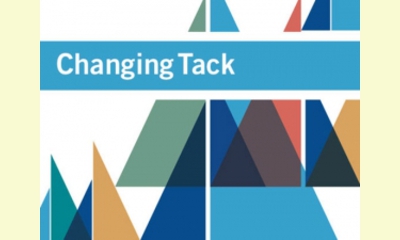|
|
New report calls for 'extended leadership' on sustainability
un articulo por Chris Guenther for GreenBiz
Each year, the Worldwatch Institute publishes its
flagship State of the World report. The 2013
edition is organized around whether sustainability
is still an attainable goal. In the opening
chapter, Worldwatch President Robert Englemen asks
starkly, "In the wake of failed international
environmental and climate summits, when national
governments take no actions commensurate with the
risk of catastrophic environmental change, are
there ways humanity might still alter current
behaviors to make them sustainable? Is
sustainability still possible?"

click on photo to enlarge
This is similar to the starting point for a new
report from SustainAbility and GlobeScan, Changing
Tack: Extending Corporate Leadership on
Sustainable Development. The report is the final,
summative output of The Regeneration Roadmap, an
18-month project designed to assess progress on
sustainable development during the last 25 years,
and to consider how to more thoroughly accelerate
and scale such progress in response to the growing
urgency of economic, social and environmental
challenges today.
Not surprisingly, Changing Tack finds that the
macro picture isn't very good. Despite decades of
well-intentioned effort and dialogue, as well as
genuine improvement in social and economic welfare
in many parts of the world, nearly every metric of
global environmental health is still moving in the
wrong direction, while inequity, volatility and
political upheaval continue to cause damaging
social disruptions in rich and poor countries
alike. Taken together, these trends threaten to
undermine or reverse progress on development more
generally, and to severely constrain opportunities
for future prosperity.
This is the sustainable development challenge in a
nutshell, and Changing Tack joins a chorus of
voices proclaiming we still have a long way to go
to improve the overall outlook. That perspective
doesn't overlook the great number of positive
examples and trends we do observe, which, even if
not yet adequate in macro terms, are both
encouraging and important. Indeed, real change is
often the result of years and years of trial and
error, accumulated effort and plenty of starts and
stops along the way. As such, it is likely that we
wouldn't recognize a meaningful tipping point on
sustainable development until well after it has
occurred. Still, it is not radical to acknowledge
that more and faster progress is needed in order
for civilization to outrun the worst of what the
future may hold.
While acknowledging the vital role of both civil
society and governments in driving the agenda
early on, Changing Tack recognizes the increasing
role and importance of private-sector leadership
today, and while others (particularly governments)
cannot be left behind, we see the private sector
as having the greatest potential to drive forward
progress in the short term.
This conclusion is partly a response to stubborn
reality: as Rio+20 and recent climate change
summits have proved, governments are still largely
incapable of delivering meaningful, enforceable
international policy frameworks for critical
issues, and civil society organizations (for now)
lack adequate influence and resources to compel
them to do so. It also rests on the view that
business has both the reasons and resources needed
to chart the course toward a more sustainable
global economy, and to pull governments, consumers
and other critical actors along with them.
|








|
DISCUSSION
Pregunta(s) relacionada(s) al artículo :
How can we get to a sustainable, peaceful economy?,
* * * * *
Comentario más reciente:
Annie Leonard: How to Be More than a Mindful Consumer
The way we make and use stuff is harming the world—and ourselves. To create a system that works, we can't just use our purchasing power. We must turn it into citizen power.
by Annie Leonard
posted Aug 22, 2013
Stuff activist Annie Leonard: “Consumerism, even when it tries to embrace ‘sustainable’ products, is a set of values that teaches us to define ourselves, communicate our identity, and seek meaning through accumulation of stuff, rather than through our values and activities and our community.” YES! photo by Lane Hartwell.
Since I released "The Story of Stuff" six years ago, the most frequent snarky remark I get from people trying to take me down a notch is about my own stuff: Don't you drive a car? What about your computer and your cellphone? What about your books? (To the last one, I answer that the book was printed on paper made from trash, not trees, but that doesn't stop them from smiling smugly at having exposed me as a materialistic hypocrite. Gotcha!)
Let me say it clearly: I'm neither for nor against stuff. I like stuff if it's well-made, honestly marketed, used for a long time, and at the end of its life recycled in a way that doesn't trash the planet, poison people, or exploit workers. Our stuff should not be artifacts of indulgence and disposability, like toys that are forgotten 15 minutes after the wrapping comes off, but things that are both practical and meaningful. British philosopher William Morris said it best: "Have nothing in your house that you do not know to be useful or believe to be beautiful."
Too many T-shirts
The life cycle of a simple cotton T-shirt—worldwide, 4 billion are made, sold, and discarded each year—knits together a chain of seemingly intractable problems, from the elusive definition of sustainable agriculture to the greed and classism of fashion marketing.
The story of a T-shirt not only gives us insight into the complexity of our relationship with even the simplest stuff; it also demonstrates why consumer activism—boycotting or avoiding products that don’t meet our personal standards for sustainability and fairness—will never be enough to bring about real and lasting change. Like a vast Venn diagram covering the entire planet, the environmental and social impacts of cheap T-shirts overlap and intersect on many layers, making it impossible to fix one without addressing the others.
I confess that my T-shirt drawer is so full it's hard to close. . ... continuación.

|
|









